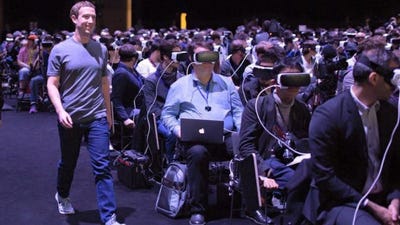Trending
Opinion: How will Project 2025 impact game developers?
The Heritage Foundation's manifesto for the possible next administration could do great harm to many, including large portions of the game development community.

Featured Blog | This community-written post highlights the best of what the game industry has to offer. Read more like it on the Game Developer Blogs or learn how to Submit Your Own Blog Post
Billions of dollars later (and many more to come, I'm sure), seemingly wild investments in Magic Leap, Oculus, and more are put into future computing perspective.

Now that the heavily invested and reviewed Magic Leap developers kit is getting released, I think it’s an opportune time to talk about future computing and put some of the industry developments in perspective.

It was only a few short years ago that the world went nuts when Oculus got acquired by Facebook for $2 billion dollars ($3 billion all things considered).
On one hand, the acquisition was a much-needed shot in the arm and woke everyone’s collective imaginations. Facebook rang the dinner bell for pocket burning cash to chase a specialized and almost non-existent virtual reality industry.
In the other hand was something the bean counters knew all along. Be it a limit in graphics processing power or the challenge of not enough content or even the debilitating fear of messing one’s hair, it seemed very improbable that Facebook could recoup their VR investment in a manner that reflected the urgency of the acquisition.
Now we’ve got Magic Leap with their first developers kit. Hyping itself up with whales crashing in gymnasiums or elephants in the palm of our hands, it too raised a quarry of billions of dollars from such companies as Alphabet (Google) and AT&T. People are a bit more hesitant to believe in the pink elephants than they were with Facebook and Oculus, yet the investment money still flows.
The question we are left with is why? Why spend these seemingly endless amounts of money for technologies and deliverables that simply don’t yet exist? The reasons are these behemoth companies are the only ones who can, and they are burdened by the limits of the current economy.
Traditionally, when an angel investor or a venture capitalist makes an investment, it’s a hindrance. There is the pain of paying, the ventures have financial risks, and the investments are structured with an exit in mind – going public, for example.
Everything is about getting the money back with a high rate of return because it doesn't grow on trees and there is another hungry entrepreneur in the winds. In a scenario like this, the Oculus and Magic Leap deals would make no sense because there aren’t any meaningful revenues to demonstrate growth, the hype diminishes with time, and there is no exit strategy for X billion dollars in something that has yet to be truly realized.

SOURCE: The Simpsons, Fox
However, what if money did grow on trees? Despite recently losing $120 billion dollars of stock value in a day (comedian John Oliver equated this to the whole concept of Cheese), Facebook’s first 2018 quarter earned them nearly $5 billion in profit. Not revenue – PROFIT. Impressive? First quarter profit for Alphabet (Google) amounted to nearly $9.5 billion dollars. To put this in perspective the combined annual sales of Advanced Micro Devices and Nvidia amounted to $12.2 billion — sales, not profit - for a whole year; and they are successful market-leading companies.
So what do you do with all that money? There is only so much you can stockpile before the shareholders get restless (this was a problem for Nintendo a few years back), charities aren’t the amazing write-offs they are cracked up to be, and there are only so many acquisitions that will really make a positive dent in your bottom line when speaking of behemoths like Facebook and Alphabet.

The remaining option is future computing; the practice of building what’s next with computers and computer media. It’s a careful balance of the three pillars which include compute performance and platforms (cloud, PC, mobile, console, AI, ML), immersive technology (AR, VR, MR, 3D, etc.), and innovative content and applications. Each pillar can stand on its own, though they are often interrelated.
The future computing deliverable for Magic Leap is the ultimate mixed reality experience. For Facebook, it’s Star Trek holodeck virtual reality. For Nvidia, it’s the self-driving car. For Alphabet, it’s all the above. These are just examples of big technological dreams that will not realize short term ROI beyond hype and maybe prospective stock prices. However, just imagine how these innovations can change the world and the endless revenue opportunities they can (will?) introduce!
Of course, I’m only talking about the super wealthy here; the most extreme dreams and examples. There are other, equally valuable ways of practicing future computing that may seem commonplace.
Have a block buster movie? Can you produce the sequel with more advanced effects for half the price? Can you get the same level of quality on the small screen for a weekly series? Future computing. Creating a new method of play for a VR or MR game for devices that haven’t arrived on store shelves yet? Future computing. Coming up with innovative ways to deliver processing power to drive our dreams? Future computing. This is all about building what’s next, and there are many equally important interlocking parts at all ends of the spectrum to make that happen.
In the future computing world, a single product is not the end result. A realized dream is the end result. In VR, the vision that people connected with was the Star Trek holodeck. For others, it was the crashing whale, or maybe it was David Hasselhoff driving his talking Trans Am! Nobody thinks about a product that delivers this, they just want the dream to happen. It’s when we associate the vision with a fixed early curve product that we run into stifling disappointments and the dream looks more like fantasy. Fantasy is a bad thing in the future computing world because it means the dream has become an impossibility, or worse - a lie.
So the next time you see some wildly crazy investment that makes no sense, see past the product and look at the dream. Is it a worthwhile dream? If enough minds and money could be placed on the problem, is it feasible for the dream to be realized? Could the success positively impact our day to day and the way we live our lives? Is there an opportunity to grow the economy beyond what already exists?
This is what future computing is about, and step by step and sometimes outlandish investments are needed to make such dreams possible. Of course, we need to find viability along the way in smaller palatable bites – and that is doable as long as we remain realistic. We have to avoid that point of fantasy, remember!
So keep dreaming and doing!

The International Future Computing Association will be holding its next voting membership meeting November 7, 2018 at the Ontario Science Centre ahead of Immersed 2018 in Toronto, Canada. See you there fellow dreamers!
You May Also Like